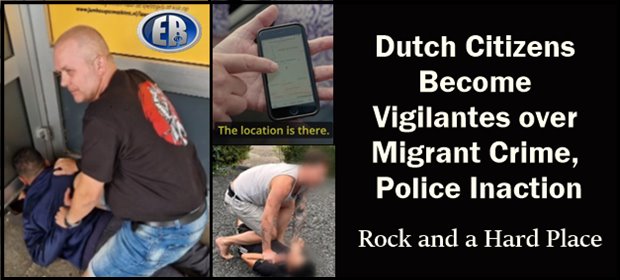
ER Editor: Ter Apel is a village in the north of the Netherlands near the German border. It’s having problems with crime and violence from what are probably illegal migrants, or ‘asylum seekers’ as we’re supposed to call them, all male according to video clips. It seems to have at least one asylum centre in the area. Citizens have decided to do their own policing in the evenings when police simply aren’t there. It’s causing controversy.
Shades of Ireland where gangs of these people roam village and town streets causing problems for locals.
Translation: Meanwhile in Ter Apel
Ondertussen in Ter Apel…👇🏻 pic.twitter.com/L0u2JGPRk4
— timmermenneke🔨 (@timmermenneke1) August 7, 2023
Translation: Asylum seekers cause enormous nuisance and crime in Ter Apel and the authorities do nothing about it. If citizens are then forced to take matters into their own hands and set up a Civil Guard, they then run the risk of being prosecuted. World upside down.
Asielzoekers veroorzaken enorme overlast en criminaliteit in Ter Apel en de autoriteiten doen er helemaal niets aan. Als de burgers dan noodgedwongen het heft in eigen hand nemen en een Burgerwacht oprichten, lopen zij vervolgens het risico vervolgd te worden. Wereld op z’n kop.
— Raisa Blommestijn (@rblommestijn) August 11, 2023
Translation: Rightly so @harryvermeegen very angry here. The police are not helping the people in Ter Apel. They then take the law into their own hands with a vigilante. And then they are more or less corrected by the same police!
Terecht dat @harryvermeegen zich hier heel kwaad maakt. De politie helpt de mensen in Ter Apel niet. Die nemen dan het recht in eigen hand met een burgerwacht. En dan worden ze min of meer terecht gewezen door diezelfde politie!https://t.co/uKfT0jmWjx
— Joost Niemoller (@JoostNiemoller) August 10, 2023
This Dutch article (browsers will translate) from 4 days ago describes a situation where locals are being blamed for taking vigilante action. See —
Nieuwsuur blames Ter Apel: Citizens are portrayed as criminals because they protect their homes with appropriate violence
Of note:
It shouldn’t get any crazier. While the good citizens from Ter Apel have seen their village change for years due to crime and nuisance, concludes News hour – in all their moral superiority – to attack these people now. What is their crime according to the elite journal? Protect their property and family as a vigilante from burglars . Believe it or not, that is apparently a serious offense in the eyes of some.
********
Dutch citizens organize patrols with app tracking and arrest migrants (Video)
Faced with rising crime related to migrants, Dutch citizens have organized civilian patrols. This has sparked a debate about the implications of an open borders policy and underscores the call to prioritize civilian safety and even consider deportations, reports Rairfoundation.
Ter Apel, Netherlands – In response to escalating crime and an increase in incidents involving asylum seekers, a vigilante group in the village of Ter Apel, Netherlands, has independently taken action to address the situation.
These efforts include patrols, the use of a special app system and civilian arrests. The group’s recent success in arresting two asylum seekers from Algeria has sparked a debate about the extent to which citizens should be involved in law enforcement and why the left-wing government is not closing borders and deporting those who threaten their citizens before crimes are committed.
Ter Apel, a village experiencing a spate of incidents involving asylum seekers mainly from North Africa, has seen a dramatic rise in shoplifting, violence and other disturbances. Despite efforts to enforce stricter rules on asylum seekers, problems persisted, prompting some residents to set up a patrol group.
A member of the patrol group related a recent incident: “I woke up at 4:15 in the morning. I heard the sound of the gate behind our house. I looked out the window. I saw two men walk away with my daughter’s bag and walking stick.” The citizen patrol immediately alerted the community police officer via an app system. The app’s location sharing feature allowed local residents to confirm their availability by sending a thumbs-up emoji.
In this particular case, the patrol group sprang into action immediately and tracked down the thieves. The suspects were cornered and apprehended with a coordinated effort by several citizens. However, open border advocates have raised questions about the legality and ethics of such actions.
Legal experts are divided on the matter. According to a police judge and emeritus professor of sanctions law, civilian arrests are permitted under certain circumstances. If citizens see a crime take place and take action in anticipation of police deployment, they are legally justified. However, some legal scholars emphasize caution, pointing out that such interventions could turn violent or wrongly affect innocent people.
The left-wing mayor of the village expressed concern about “vigilante justice” justice and advised residents to report crimes to the police rather than take matters into their own hands. The Justice Department joined in, suggesting that citizens’ “frustration” is understandable, but should not replace official law enforcement.
A video report showed how one of the suspects arrested last week was tied up with tie-wraps after he was arrested. Experts differed on the level of force to be used in such situations. While some argue that such measures may be acceptable for more serious crimes such as residential burglaries, others consider it excessive and potentially dangerous.
The patrol group remains resolute and defends their actions as a response to the lack of law enforcement presence during the evening hours. They claim that several authorities are active during the day, but the residents are left to fend for themselves at night.
A member of the patrol group acknowledged the challenges they face: “It’s about all sorts of things. There are threats, shoplifting, harassment, intimidating behavior, drunkenness.” They emphasize that their actions are driven by a sense of responsibility for the safety of their community.
In light of the challenges posed by open borders and the presence of potentially dangerous migrants, Ter Apel emerges as a microcosm, reflecting wider conversations about community security and the responsibilities of citizens in maintaining order.
The creation of the patrol group was additionally spurred by the Liberal Left government’s policy of unrestricted borders and inadequate vetting processes. This has led to a compelling need for these patrols in response to the security threats imposed on local communities by political decisions instead of politicians focusing on protecting the well-being and rights of illegal migrants.
************
Source

••••
The Liberty Beacon Project is now expanding at a near exponential rate, and for this we are grateful and excited! But we must also be practical. For 7 years we have not asked for any donations, and have built this project with our own funds as we grew. We are now experiencing ever increasing growing pains due to the large number of websites and projects we represent. So we have just installed donation buttons on our websites and ask that you consider this when you visit them. Nothing is too small. We thank you for all your support and your considerations … (TLB)
••••
Comment Policy: As a privately owned web site, we reserve the right to remove comments that contain spam, advertising, vulgarity, threats of violence, racism, or personal/abusive attacks on other users. This also applies to trolling, the use of more than one alias, or just intentional mischief. Enforcement of this policy is at the discretion of this websites administrators. Repeat offenders may be blocked or permanently banned without prior warning.
••••
Disclaimer: TLB websites contain copyrighted material the use of which has not always been specifically authorized by the copyright owner. We are making such material available to our readers under the provisions of “fair use” in an effort to advance a better understanding of political, health, economic and social issues. The material on this site is distributed without profit to those who have expressed a prior interest in receiving it for research and educational purposes. If you wish to use copyrighted material for purposes other than “fair use” you must request permission from the copyright owner.
••••
Disclaimer: The information and opinions shared are for informational purposes only including, but not limited to, text, graphics, images and other material are not intended as medical advice or instruction. Nothing mentioned is intended to be a substitute for professional medical advice, diagnosis or treatment.






GonadTheRuffian said it all so beautifully and correctly. Well done and thanks for your comment worth of gold. All our servants (officials) who are supposed to serve European peoples but cryptically work for globalists by supporting (((globalists’))) agenda of destruction of all Western nations, cultures and values must be apprehended by the people, investigated and accordingly charged for the worst crimes of treason. Time to cleanse all institutions of these whores who commit these crimes for money and promotion.
Any normal, honest person knows the purpose of this MASS INVASION by Non-White, 3rd World invaders is to destroy and replace the White Natives. This is the essence of the Great Replacement. The politicians, bureaucrats, Fake News, gestapo, propaganda mills (education system) are all in on it. So its no surprise when citizens form militias, that the traitorous, afore-mentioned groups are not happy with it.
Anyone with an ounce of common sense knows what has to come next. This of course excludes every single virtue-signaling “Progressive” in every Western democracy.